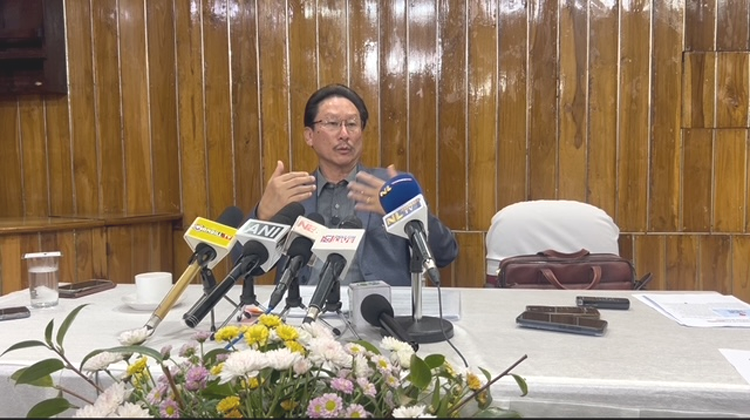Government Spokesperson and Minister for Power & Parliamentary Affairs, KG Kenye has said that discussions over the proposed Frontier Nagaland Territorial Authority (FNTA) are at a sensitive and crucial stage, and called for greater coordination and communication among all stakeholders, particularly between the Eastern Nagaland People’s Organization (ENPO) and the Eastern Nagaland Legislators’ Union (ENLU).
Addressing media persons at Hotel Japfü, Kohima, on October 30, Kenye stated that the State Government’s inclusion in the dialogue—earlier a bilateral process between ENPO and the Ministry of Home Affairs—has brought more transparency into the process. “It is now a trilateral talk, and the State has a rightful place in it,” he said.
He informed that after consultations with mass-based organizations and several Cabinet meetings chaired by Chief Minister Neiphiu Rio, the State Government has submitted its recommendations to the Centre on how the proposed arrangement should function, while ensuring Nagaland’s territorial and constitutional integrity remains protected.
Kenye added that the Centre has returned the State’s recommendations for further review with more inputs from the ENPO. He noted that the Cabinet had identified communication gaps between ENPO and ENLU and urged both sides to ensure complete consultation before any final agreement is reached.
“The 20 legislators from the region must be fully aware of what is being negotiated, since they are elected representatives of the people,” Kenye said. “Any decision made without their knowledge could create confusion and disappointment.”
Explaining that the FNTA is a new model—neither a Union Territory nor a Sixth Schedule body—he said it must function within the framework of Article 371(A). While affirming the government’s support for the genuine aspirations of the eastern people, he emphasized that the State cannot abdicate responsibility over any part of Nagaland.
He pointed out that certain departments such as Power, Health, and Education may initially remain under State supervision due to logistical and financial constraints. Citing his own department as an example, he said the Power sector depends largely on centrally funded schemes and shared revenue obligations.
Kenye stated that the State Government will forward its reviewed recommendations to the Centre only after the ENPO and ENLU reconcile their positions. “There is no time limit,” he said. “We want a solution that stands the test of time and protects everyone’s interests.”
He concluded by expressing hope that the Centre would consider Nagaland’s recommendations “with kindness and understanding,” reaffirming that “nothing in the talks will go against the unity or integrity of the State.”
Download Nagaland Tribune app on Google Play

RIIN exercise crucial for ILP enforcement and indigenous identity clarity
KG Kenye also highlighted that the State Government’s renewed push to update the Register of Indigenous Inhabitants of Nagaland (RIIN) aims to ensure effective implementation of the Inner Line Permit (ILP) system and to protect the rights of genuine indigenous citizens.
He said the Cabinet has prioritized the indigenous status issue as a key administrative reform, explaining that ILP enforcement requires a clear demarcation of who qualifies as an indigenous inhabitant—something that earlier governments failed to maintain due to leniency in previous decades.
The government, he said, has initiated verification to enlist genuine indigenous citizens and delist others—an effort he admitted “ that has faced resistance but is necessary to restore administrative order”.
Kenye clarified that “indigenous tribes” refer to those whose forefathers settled in the present territory centuries ago and exercised ownership of the land. However, he acknowledged that challenges have emerged over the status of certain sub-tribes such as Kukis, Kacharis, Mikirs (Karbis), and Garos, whose populations are spread across neighboring states like Assam, Manipur, Mizoram, and Meghalaya.
He warned that without clear demarcation, overlapping ethnic presence could allow individuals to claim indigenous rights in multiple states, undermining ILP regulations.
Accordingly, district administrations and tribal bodies have been directed to verify ancestry at the village level using early electoral rolls as reference. However, he noted that some communities have opposed this and taken the matter to court.
As a result, the Cabinet has decided to freeze all earlier benefits and recognitions for the concerned groups until the court delivers its verdict. “The Scheduled Tribe status will remain, but indigenous status is a separate matter and under review,” Kenye clarified.
He reiterated that the government’s efforts, though stern, are necessary to safeguard the State’s future and ensure clarity for both citizens and policymakers.
Government yet to deliberate on NLTP revocation proposal
On the Naga Council Dimapur’s recent proposal seeking revocation of the Nagaland Liquor Total Prohibition (NLTP) Act, 1989, KG Kenye informed that the State Government has not yet held any discussion on the matter.
He said that while the Cabinet had earlier explored the possibility of revisiting the Act for the overall benefit of the State, the move was kept on hold following mixed public reactions.
Kenye said the government views the matter as a people-centric issue and would prefer citizens to express their collective opinion before any decision is taken.
Commenting on the Naga Council’s recent stand, the Minister said the Cabinet has not yet taken cognizance of the proposal but may deliberate on it in due course.
He urged the media to engage the public in gathering diverse opinions, noting that an informed and balanced discourse would help policymakers assess the issue better.
Kenye added that the government continues to monitor the debate closely, observing that Dimapur’s unique context as a commercial and border town presents distinct challenges compared to other districts.

